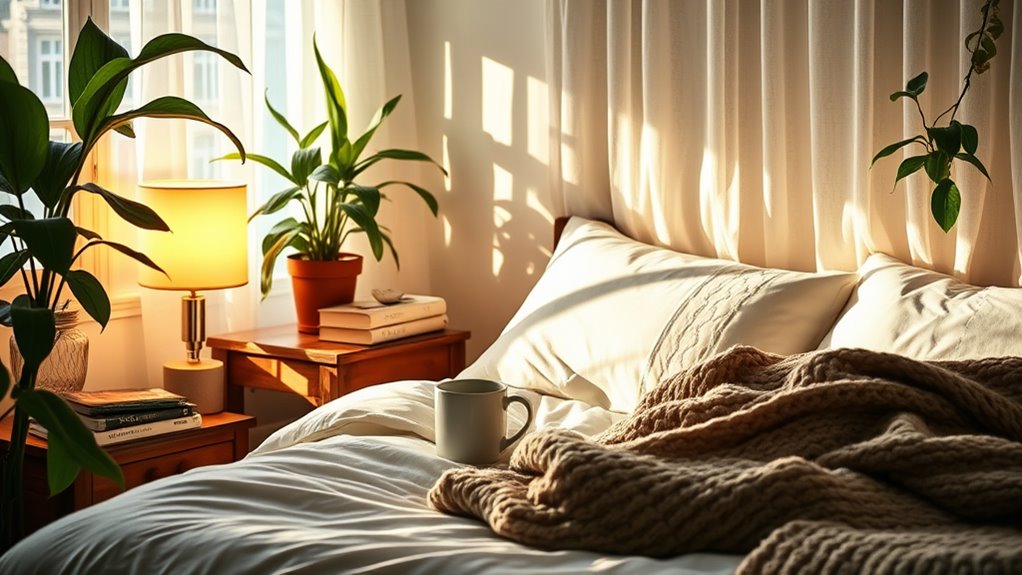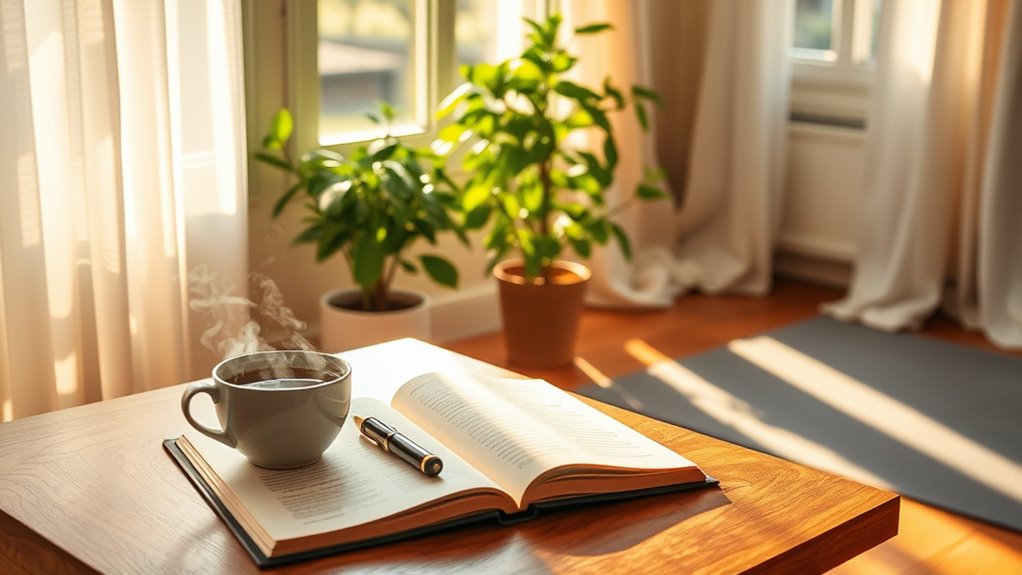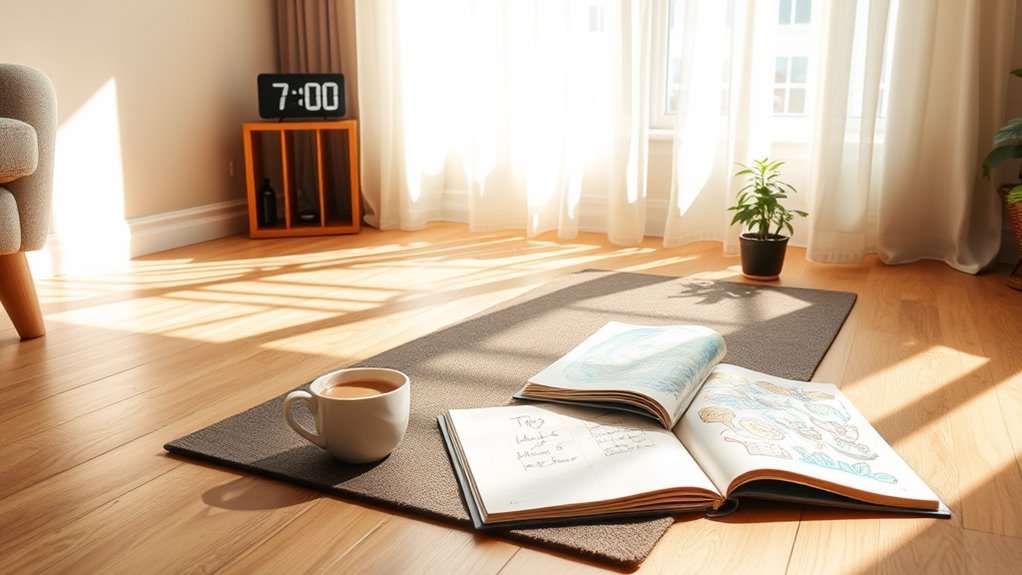How to Create the Perfect Nighttime Routine for Deep Sleep
To create the perfect nighttime routine for deep sleep, start by setting a consistent sleep schedule and winding down 30 minutes before bed. Dim the lights and engage in calming activities like reading or meditating. Avoid screens and establish a device curfew to reduce blue light exposure. Optimize your sleep environment by keeping it cool and dark. Incorporate relaxation techniques and manage your caffeine and food intake. There’s more to discover about improving your sleep quality!
Key Takeaways
- Establish a consistent sleep schedule by going to bed and waking up at the same time every day, aiming for 7-9 hours of sleep.
- Create a relaxing sleep environment by keeping your bedroom cool (60-67°F), dark, and quiet with minimal distractions.
- Limit screen time at least one hour before bed to enhance melatonin production and improve sleep quality.
- Incorporate calming activities into your nighttime routine, such as reading, journaling, or practicing relaxation techniques like deep breathing.
- Maintain a healthy lifestyle by exercising regularly, managing caffeine intake, and avoiding heavy meals before bedtime.
Understanding the Importance of a Nighttime Routine
When you establish a nighttime routine, you signal your body that it’s time to wind down and prepare for sleep. This essential step lays the groundwork for better sleep by creating a predictable environment.
By incorporating calming activities like reading, meditating, or gentle stretching, you actively engage your mind and body, signaling that it’s time to shift into rest. Dimming the lights and reducing screen time further enhances this process, allowing your brain to produce melatonin effectively. Additionally, engaging in simple nighttime rituals can significantly improve your overall sleep quality.
As you consistently follow this routine, you’ll notice improvements in your sleep quality, leading to increased energy and focus during the day. Mastering this routine isn’t just about sleep; it’s about fostering a holistic approach to your overall well-being.
Setting a Consistent Sleep Schedule
Establishing a consistent sleep schedule is essential for regulating your body’s internal clock and improving your overall sleep quality.
To master your sleep, aim to go to bed and wake up at the same time every day, even on weekends. This consistency reinforces your circadian rhythm, helping you fall asleep faster and wake up refreshed.
Start by determining your ideal sleep duration, typically 7-9 hours for adults. Gradually adjust your bedtime if needed, making changes in 15-minute increments.
Avoid screen time and stimulating activities an hour before sleep; instead, engage in calming rituals. Additionally, common sleep mistakes can significantly disrupt your routine, so be mindful of factors that may affect your sleep quality.
Creating a Relaxing Sleep Environment
To get better sleep, your bedroom needs to be a sanctuary.
Start by optimizing the temperature, dimming the lights, and minimizing any noise distractions.
These simple changes can greatly enhance your sleep environment. Incorporating essential pre-bedtime routines can further help signal to your body that it’s time to wind down.
Optimize Bedroom Temperature
The ideal bedroom temperature for deep sleep typically falls between 60 and 67 degrees Fahrenheit.
To optimize your sleep environment, start by adjusting your thermostat or using a fan to maintain this range. If you find it difficult to stay cool, consider breathable bedding and pajamas made from natural fibers like cotton.
You might also want to invest in a quality mattress that regulates temperature effectively. Don’t forget about the impact of humidity—aim for a comfortable level to prevent sticky discomfort.
Experiment with different setups until you discover what feels most invigorating for you. Remember, a cooler room enhances melatonin production, helping you fall asleep faster and enjoy deeper, more restorative sleep. Additionally, implementing this easy bedtime routine change can further enhance your overall sleep quality.
Dim Lighting Options
While you prepare for sleep, dim lighting can greatly enhance your relaxation and signal to your body that it’s time to wind down.
Consider using soft, warm-toned lamps or LED lights with adjustable brightness. These options create a calming atmosphere, unlike harsh overhead lights. You might also explore smart bulbs that can be programmed to gradually dim as bedtime approaches, reinforcing your nightly routine.
Additionally, incorporating candles can add a soothing element, but remember to prioritize safety.
As you turn down the lights, allow your mind to release the day’s stresses. This intentional shift in lighting not only helps you unwind but also encourages the production of melatonin, promoting deeper, more restorative sleep. Implementing a simple evening routine can further enhance your relaxation process.
Embrace these dim lighting options for a serene sleep environment.
Minimize Noise Distractions
Even if you’ve created a cozy atmosphere for sleep, excessive noise can disrupt your ability to drift off peacefully. To cultivate a serene environment, take action against unwanted sounds. Consider soundproofing your space or using white noise machines.
| Noise Sources | Solutions |
|---|---|
| Traffic | Soundproof windows |
| Loud Neighbors | White noise machines |
| Barking Dogs | Earplugs or noise-canceling headphones |
Awareness of noise distractions empowers you to master your sleep environment. By minimizing disturbances, you’re not just enhancing your sleep quality; you’re investing in your overall well-being. Prioritize peace, and watch how your sleep transforms into a restorative oasis.
Limiting Screen Time Before Bed
To enjoy a restful night’s sleep, it’s crucial to limit screen time before bed, as the blue light emitted by devices can interfere with your body’s natural sleep-wake cycle. Aim to unplug at least an hour before you plan to sleep.
Use this time to engage in activities that promote relaxation and focus on winding down. Instead of scrolling through social media or binge-watching shows, consider reading a book, journaling, or practicing mindfulness.
If you must use your devices, consider using blue light filters or setting them to night mode. By prioritizing this digital detox, you’ll create an environment conducive to deep sleep, allowing your body to recharge and restore effectively.
Master this habit for lasting benefits.
Incorporating Relaxation Techniques
Incorporating relaxation techniques into your nighttime routine can considerably enhance your quality of sleep.
Start by practicing deep breathing exercises; inhale slowly through your nose, hold for a few seconds, and exhale through your mouth. This method calms your nervous system and prepares your mind for rest.
You might also explore progressive muscle relaxation, where you systematically tense and then relax each muscle group, fostering physical ease.
Guided meditations or soothing music can further cultivate a serene atmosphere.
Experiment with aromatherapy by using calming scents like lavender to create a tranquil environment.
Finally, consider journaling your thoughts to clear your mind of the day’s distractions.
These techniques can lead you to a more restful and restorative sleep.
Establishing a Pre-Sleep Ritual
To create a restful pre-sleep ritual, start by setting a consistent schedule for when you go to bed and wake up.
Limit your screen time in the hour leading up to sleep, as it can interfere with your body’s natural rhythms.
Incorporating relaxation techniques during this time can help you unwind and prepare for deep sleep.
Set a Consistent Schedule
A consistent sleep schedule can greatly enhance the quality of your rest. By going to bed and waking up at the same time daily, you train your body’s internal clock, leading to more restorative sleep.
This discipline helps your mind and body know when to wind down and when to rise, making it easier to embrace deep sleep.
To set a consistent schedule, consider these strategies:
- Choose a bedtime and stick to it: Find a time that allows for 7-9 hours of sleep.
- Create a wind-down period****: Allocate 30 minutes before bed for relaxation activities.
- Avoid naps: If you must nap, keep it short to preserve your nighttime sleep quality.
Mastering this routine can greatly elevate your sleep experience.
Limit Screen Time
How can you guarantee a restful night’s sleep? Start by limiting screen time in the hour before bed. The blue light emitted by phones, tablets, and computers interferes with your body’s natural production of melatonin, the hormone that regulates sleep.
By setting boundaries, you’ll signal your brain that it’s time to unwind. Create a device curfew—perhaps 60 minutes before bedtime—where you disconnect from all screens. Instead, engage in activities that promote calm, like reading a book or journaling.
This intentional shift not only prepares your mind for rest but also enhances your overall sleep quality. Mastering this discipline will transform your nighttime routine, making deep, restorative sleep a reality.
Prioritize this habit for lasting benefits.
Relaxation Techniques Before Sleep
After reducing screen time before bed, incorporating relaxation techniques can further enhance your pre-sleep ritual.
These methods help calm your mind and prepare your body for restorative sleep. Here are some effective techniques to contemplate:
-
Deep Breathing: Focus on your breath, inhaling deeply through your nose and exhaling slowly through your mouth. This practice reduces stress and promotes relaxation.
-
Progressive Muscle Relaxation: Tense and then relax each muscle group, starting from your toes and working your way up. This technique releases physical tension and signals your body to unwind.
-
Gentle Stretching or Yoga: Engage in simple stretches or yoga poses to release tension and improve circulation, setting the stage for a peaceful night’s rest.
Integrate these techniques into your routine for ideal sleep mastery.
Choosing the Right Sleep Products
As you prepare to enhance your nighttime routine, selecting the right sleep products becomes essential for achieving deep and restorative sleep.
Start with a quality mattress that supports your body’s natural alignment; this is vital for comfort and spinal health.
Pillows should complement your sleeping position, providing adequate support to your neck and head.
Consider breathable, soft bedding materials like cotton or bamboo to regulate temperature throughout the night.
Eye masks and blackout curtains can block light, creating a serene environment.
Finally, incorporating a white noise machine or soothing sound app can mask disruptive noises.
Managing Caffeine and Food Intake
Creating a peaceful sleep environment sets the stage for better rest, but what you consume before bed plays a significant role too.
Managing your caffeine and food intake is essential for achieving deep sleep. To optimize your nighttime routine, consider these guidelines:
-
Limit caffeine: Avoid caffeine six hours before bedtime to prevent disruption in your sleep cycle.
-
Mind your meals: Opt for light snacks if you’re hungry; heavy meals can lead to discomfort and restless nights.
-
Hydrate wisely: Drink water, but cut off fluid intake 1-2 hours before sleep to minimize nighttime trips to the bathroom.
Staying Active During the Day
While you might think that winding down at night is the key to a good sleep, staying active during the day can greatly impact your rest. Engaging in regular physical activity elevates your mood and boosts energy levels, making you more alert throughout the day.
Aim for at least 30 minutes of moderate exercise, whether it’s walking, jogging, or strength training. This not only helps regulate your circadian rhythm but also promotes deeper sleep.
Don’t forget to incorporate movement into your daily routine; short breaks for stretching or brisk walks can enhance your overall activity level. Ultimately, cultivating an active lifestyle plays an essential role in preparing your body for the restorative sleep you desire each night.
Keeping a Sleep Diary
How can keeping a sleep diary transform your nighttime rest? By tracking your sleep patterns and habits, you can identify what’s working and what isn’t. This powerful tool empowers you to fine-tune your nighttime routine for ideal rest.
-
Record sleep times and duration: Note when you go to bed and wake up to spot patterns.
-
Document nighttime habits: Write down activities before sleep, like screen time or caffeine consumption.
-
Evaluate your mood and energy: Reflect on how you feel each morning to connect sleep quality with daily performance.
With this data, you’ll be better equipped to make informed adjustments and enhance your overall sleep quality, leading to deeper, more restorative rest.
Adjusting Your Routine as Needed
It’s important to monitor your sleep quality and adjust your routine as needed.
Life changes can impact your sleep, so being flexible is key.
Don’t hesitate to experiment with different techniques to find what works best for you.
Monitor Sleep Quality
To guarantee you’re getting the best possible sleep, regularly monitoring your sleep quality is essential.
By tracking your sleep patterns, you can identify areas for improvement and adjust your routine accordingly.
Use these strategies to enhance your sleep experience:
-
Utilize a Sleep Tracker****: Wearable devices or apps can provide insights into your sleep stages and duration.
-
Keep a Sleep Journal****: Documenting your sleep habits and how you feel each day can help pinpoint factors affecting your rest.
-
Evaluate Your Environment: Assess your bedroom’s temperature, noise levels, and lighting to confirm they promote deep sleep.
Adapt to Life Changes
As life changes, whether it’s a new job, a move, or shifts in family dynamics, adapting your nighttime routine becomes essential for maintaining deep sleep. You can’t expect the same practices to work when your circumstances shift.
Start by evaluating your current routine; identify what may no longer serve you. If late-night meetings disrupt your sleep, adjust your wind-down time accordingly. Incorporate new relaxation techniques that resonate with your current lifestyle, like deep breathing or gentle stretching.
Stay attuned to your body’s signals—if you feel restless, modify your environment or schedule. Embracing flexibility in your routine empowers you to navigate life’s changes while safeguarding your sleep quality.
Experiment With Techniques
While you may have established a nighttime routine, don’t hesitate to experiment with different techniques to enhance your sleep quality. Your ideal routine mightn’t look the same every night, so be open to adjustments.
Try varying your activities and assess how they impact your rest.
-
Incorporate Relaxation Exercises****: Experiment with deep breathing or guided meditation to see what calms your mind best.
-
Adjust Lighting: Test various light levels; dimming lights earlier might signal your body it’s time to wind down.
-
Change Your Sleep Environment: Altering room temperature or bedding materials can greatly affect comfort and sleep quality.
Frequently Asked Questions
How Long Should I Spend on My Pre-Sleep Ritual?
You should spend 30 to 60 minutes on your pre-sleep ritual. This timeframe allows your mind and body to unwind, setting the stage for relaxation and a smooth shift into restorative sleep. Prioritize consistency for best results.
Can Naps During the Day Affect Nighttime Sleep?
Yes, naps can impact your nighttime sleep. If you nap too long or too late in the day, you might find it harder to fall asleep at night. Timing and duration are key for ideal rest.
What Temperature Is Ideal for Sleeping at Night?
Research shows that the ideal sleeping temperature hovers around 60 to 67 degrees Fahrenheit. You’ll find that maintaining this temperature helps your body regulate sleep cycles, leading to deeper, more restorative rest throughout the night.
How Do I Know if My Mattress Is Affecting Sleep?
To determine if your mattress affects your sleep, pay attention to discomfort, tossing, turning, or waking up stiff. If you’re experiencing these issues consistently, it’s likely time to contemplate a new mattress.
Are There Specific Scents That Promote Better Sleep?
They say, “The nose knows.” Scents like lavender, chamomile, and sandalwood can enhance relaxation, signaling your brain it’s time to unwind. Experiment with essential oils or candles to discover what helps you drift into deeper sleep.





